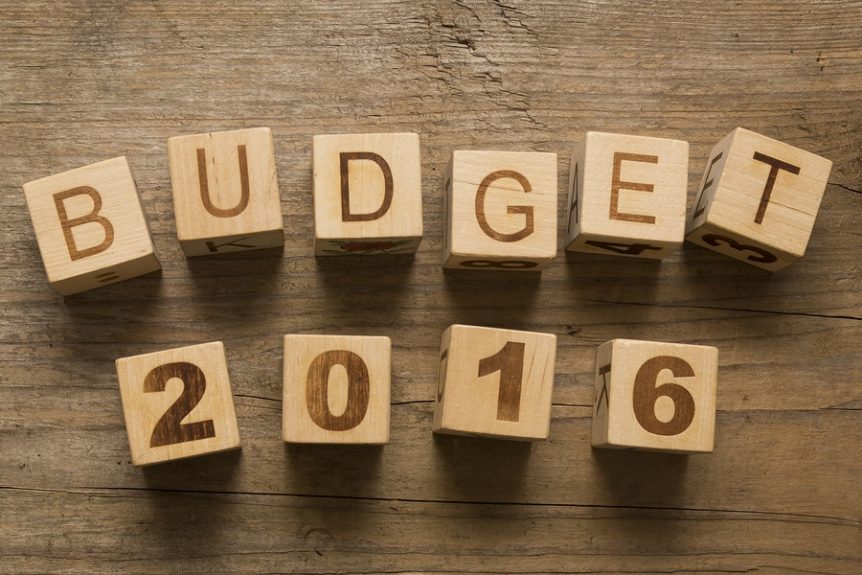On the 16th of March the government announced the 2016 Budget.
- In this summary we have focused on the main issues that affect small businesses.
- Full Budget – you can get it from HMRC here.
- Timing – some of these announcements come into effect now or shortly but many of them are for the year after or beyond.
- Largely a positive budget for small business.
Increasing the personal allowance and higher tax band and also on decreasing corporation tax rates is welcome and the simplification of national insurance for the self-employed is long overdue.
We are updating our free mobile accounting app with all this information just as soon as we can with a lot already done. If you have not already got it see how here.
Income tax
The personal allowance for 16/17 (6th April 2016 to 5th April 2017) is set at £11,000, this will now increase to £11,500 for 17/18, whilst the higher tax band, which is set at £43,000 for 16/17 will increase to £45,000 for 17/18.
Class 2 National Insurance (Self-Employed)
It’s a while off, but from 2018 Class 2 NI for the self-employed will be no more so if you’re self-employed you should only have one category of national insurance to worry about (currently known as Class 4). This is a much needed simplification of the national insurance system for the self-employed.
Directors Loans
The tax paid on directors loan balances that remain unpaid within 9 months of the end of an accounting year, known as s455 tax, will increase from 25% to 32.5% for any loans that are made from 6th April 2016.
Corporation tax
Corporation tax will drop from the current rate of 20% to 19% from April 2017 (this was already known). However corporation tax was expected to drop again to 18% by 2020 but this has now been reduced further down to 17%. This, along with the increased personal allowance and higher tax band should help mitigate the extra tax payable due to the changes to dividend taxation which start from the 6th April 2016
Lifetime ISA
This is an interesting one, it doesn’t come in for a year, but from April 2017 there will be a new savings structure called the ‘Lifetime ISA’. If you’re under 40 you’ll be able to open a Lifetime ISA and save up to £4,000 per tax year and you will get a 25% bonus from the government. So for every £4 you pay into the Lifetime ISA the government will put £1 in. You will be able to pay into the ISA and get the government bonus 25% until you’re 50. There are various rules about when you can withdraw the cash and potential tax consequences. HMRC have a fact sheet about the Lifetime ISA here.
The general overall ISA limit (total for all your ISAs) will also be increasing from April 2017 – from £15,240 to £20,000.
Capital Gains Tax
This was somewhat un-expected – from 6th April 2016 capital gains tax rates are reducing. The higher rate will reduce from 28% to 20% and the basic rate will reduce from 18% to 10%. There will be various rules and details about this to come out, one of them being that these new lower rates do not apply to residential property (i.e. buy-to-lets) which will continue to be taxed at current capital gains tax rates.
Public Sector Personal Service Companies and IR35
If you work through your own personal service company and contract with public sector clients this could have quite an effect on you, although the details are still to come. From April 2017 if you work through your own company in the public sector you will not be able to personally decide if IR35 (the intermediaries legislation) applies. It will be the agency or the public sector employer that has to decide if IR35 applies or not, and if they deem that you are caught by IR35 it will be them that have to deduct the applicable tax and national insurance.
This appears to be a first step by HMRC in their attempt to reform IR35.
HMRC have also announced that there will be a new online tool you can use to test your IR35 status, although previous attempts at this have not been very successful!
VAT registration threshold
The VAT registration threshold that is currently £82,000 will increase to £83,000 from 1 April 2016.
Digital accounting records – we have you covered
The Government announced it wants all businesses to send HMRC a summary of their accounting records every quarter. This data will update the “digital tax account” for that business held by HMRC, and will enable the taxpayer to see what tax they should be paying much earlier than would be the case when submitting an annual tax return.
To enable this to become a reality, every business, and every landlord who receives more than £10,000 of income, will have to maintain their accounts using software that can communicate directly with HMRC. That excludes electronic spreadsheets, and of-course paper based accounting records.
The small businesses need to convert to digital accounting within two years, as businesses with turnover below VAT threshold will be required to submit quarterly updates from April 2018.
We are specialist in digital and our clients already use the latest software putting us in a great position already for this change. Other businesses and accountants will quite frankly have to change, catch up or call us.





